Aid chief deplores lack of access to Gaza
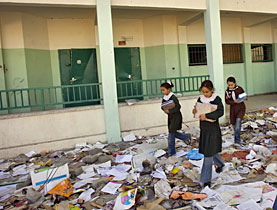
Switzerland's top humanitarian official has said access of relief and medical goods to Gaza is still the worst problem, describing the territory as a prison.
Toni Frisch, the deputy director-general of the Swiss Agency for Development and Cooperation (SDC), who ended a visit to Gaza on Sunday, tells swissinfo that Swiss aid did get through but many have to wait.
Speaking by phone from the Jordan Valley, Frisch said that people on the ground have difficulty making sense of the extent of the collateral damage that resulted from the heavy bombardment by Israel in January.
Israeli forces had dropped leaflets and made telephone calls to warn of impending attacks, and its diplomatic officials say the military repeatedly called off attacks where it deemed civilians were at risk.
The Jewish state has been accused of using disproportionate force in the 22-day conflict, which killed between 1,200 and 1,300 people. Israel says Hamas fighters embedded themselves amongst the civilian population and that the Islamist organisation used schools and mosques as staging grounds for attacks into Israel.
On Monday, Hamas accused its rival, Fatah, of colluding with Israel to attack Gaza using Google Earth.
swissinfo: Can you describe what you saw in Gaza?
Toni Frisch: I have not been surprised by what I have seen. I have been in the humanitarian business for 30 years. I have seen many, many disasters and crises, and of course, there has been damage. There have been people killed and injured and this was very dramatic. But all in all, I was not surprised, seeing the reality now after having heard and read, and after having been informed by our team.
swissinfo: What stood out for you?
T.F.: People understand somehow that there were attacks and air raids. But they cannot understand that there was so much collateral damage, that there was so much damage in schools, in warehouses and that even hospitals were affected, and that so many civilians were killed. And it is difficult for them to understand that agriculture programmes were affected. Of course, the tanks and bulldozers were crossing the fields and farmland.
The very serious problem has always been access. The Gaza Strip is in a condition where people are like in a prison. They have no free movement at all. Everyday goods have not been able to cross for a year-and-a-half. Access to relief and medical goods was not given and this was not understood.
We were privileged to bring in our relief goods but many had to wait day by day to bring in these relief goods. This is the most serious problem.
swissinfo: You mentioned you were shocked at the damage to agriculture facilities and schools in Gaza. How capable is the Hamas administration of organising a rebuilding process?
T.F.: I can tell you that all these programmes are fully independent of the local government or responsible political authority or whatever – call it Hamas. It is not as people thought or as journalists thought, that we are bringing money or goods [to terrorists] as mentioned in a Swiss newspaper.
We have our network of distribution, we have local specialists, local collaborators for many years. We are working with UNRWA [United Nations Relief and Works Agency for Palestine Refugees in the Near East], with the ICRC [International Committee of the Red Cross] and we have a network of hundreds of people and we can identify precisely where these relief goods go.
Recovery and reconstruction projects in the future will be organised so that there is no danger of that. People think that humanitarian aid is something that you can learn today and tomorrow you are the specialist. That’s not the case. It’s a profession also. Too many people think it is just something done with a good heart, but that’s not sufficient.
swissinfo: The UN halted humanitarian supplies to Gaza earlier this month after Hamas seized relief supplies. How do you balance on one hand operating autonomously but also dealing with Hamas, which is the elected government in Gaza?
T.F.: It is clear that many organisations and governments are reluctant to cooperate fully. If they do, they are criticised, so this is a problem. So each government must decide for itself the best way.
We have our ways; we have a clear view of how we will do it. For Switzerland, in the early recovery phase or continuing with the programmes we have been running now, I do not see any problems and I can tell you that nothing is going into the wrong hands.
In the Sharm el Sheikh conference, there were two topics: humanitarian aid, and reconstruction and early recovery. But there is no need to talk about early recovery as long as not even cement is allowed to be brought in in sufficient quantities. You must not talk about reconstruction. This is the most serious problem – to give free access to those goods needed every day.
swissinfo: Suppose there is free access at some point. What kind of investment is needed to raise the standard of living so that it is on par with its Arab neighbours?
T.F.: I do not know. Frankly, these are political questions. They must be raised during the conference and practical solutions have to be found, and of course, access… at least access given to a sufficient quantity and number of lorries every day that at least the damage to houses and hospitals and schools can be repaired. Look, it is absolutely [fundamental] that this is done.
swissinfo: Do you see Gaza being independent of humanitarian aid at some point in the near future? Will the administration be able to provide for its own people?
T.F.: I hope so, that they are independent. For the moment, I must say, these people are in no way interested in humanitarian aid. They want to have access and they want to have the goods they need for their normal lives, to rebuild, that children can go to school, that patients can be treated in hospitals.
This is what is needed and wanted. But I can tell you that as soon as normalcy is there, humanitarian aid will not be needed anymore, I suppose. Of course, perhaps occasionally, but not in a general way.
But now, at least 50 per cent or even more – 70 per cent – of people in the Gaza strip are dependent on relief operations and relief goods coming in. This is an absolutely distressing situation and is disastrous.
swissinfo: Do you think Hamas is in a position to provide these services? Do they have the administrative capacity to do it and the qualified personnel?
T.F.: I cannot answer this question. It is purely hypothetical. It is impossible. In any case, whoever is responsible, whoever is the authority in the Gaza Strip, they must have more or less, normalcy. If that is not the case, nobody is independent, nobody has the capacity to organise part of a country.
swissinfo-interview: Justin Häne
December 27: Israel launches aerial bombardment on Gaza.
January 3: Israeli ground troups enter Gaza Strip.
January 8: UN calls for immediate ceasefire, leading to Israeli withdrawal.
January 16: Israeli-US agreement on combating Hamas weapons smuggling.
January 17: Israeli proclaims a unilateral ceasefire.
January 18: Hamas announces its own ceasefire, conditional on an Israeli withdrawal within one week. Israeli forces start withdrawing.
Between 1,200 and 1,300 Palestinians are reported to have been killed in the fighting.
Israel says it has lost a total of 13 killed.
The Gaza Strip is a piece of land on the eastern Mediterranean coast about 41 kilometers long and 12 kilometres wide at its widest point, a total of 360 square kilometres.
It is bounded by Israel to the north and east, and Egypt in the south.
It has a population of about 1.5 million, giving it a population density of over 4,000 per square kilometre.
The bulk of the inhabitants are refugees or descendants of refugees.
In 1967 Israel occupied the territory and created 21 Jewish settlements there.
After the Oslo accords of 1993, the Palestinian Authority took over the administration.
Israel withdrew completely in 2005, but retained control of the border points.
In Palestinian legislative elections in 2006, Hamas won a clear victory.
After a struggle with the Fatah party of Palestinian president Mahmud Abbas, Hamas took control of the Gaza Strip in June 2007.
Israel has kept the territory under a tight blockade since June 2007.
Palestinian militants have fired rockets into southern Israel, in particular at the town of Sderot close to the border.
A six-month ceasefire agreed between the two sides in June 2008 was not renewed when it ended in December.
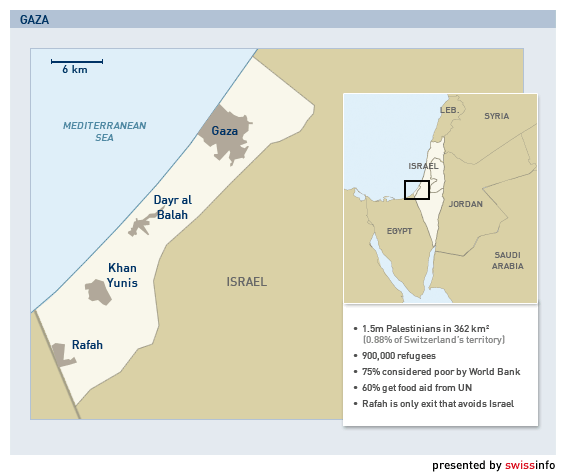

In compliance with the JTI standards
More: SWI swissinfo.ch certified by the Journalism Trust Initiative
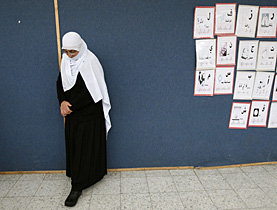
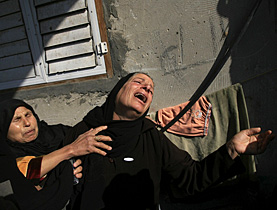
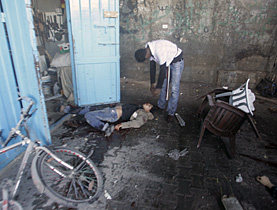
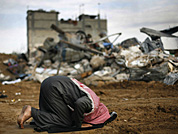
You can find an overview of ongoing debates with our journalists here. Please join us!
If you want to start a conversation about a topic raised in this article or want to report factual errors, email us at english@swissinfo.ch.